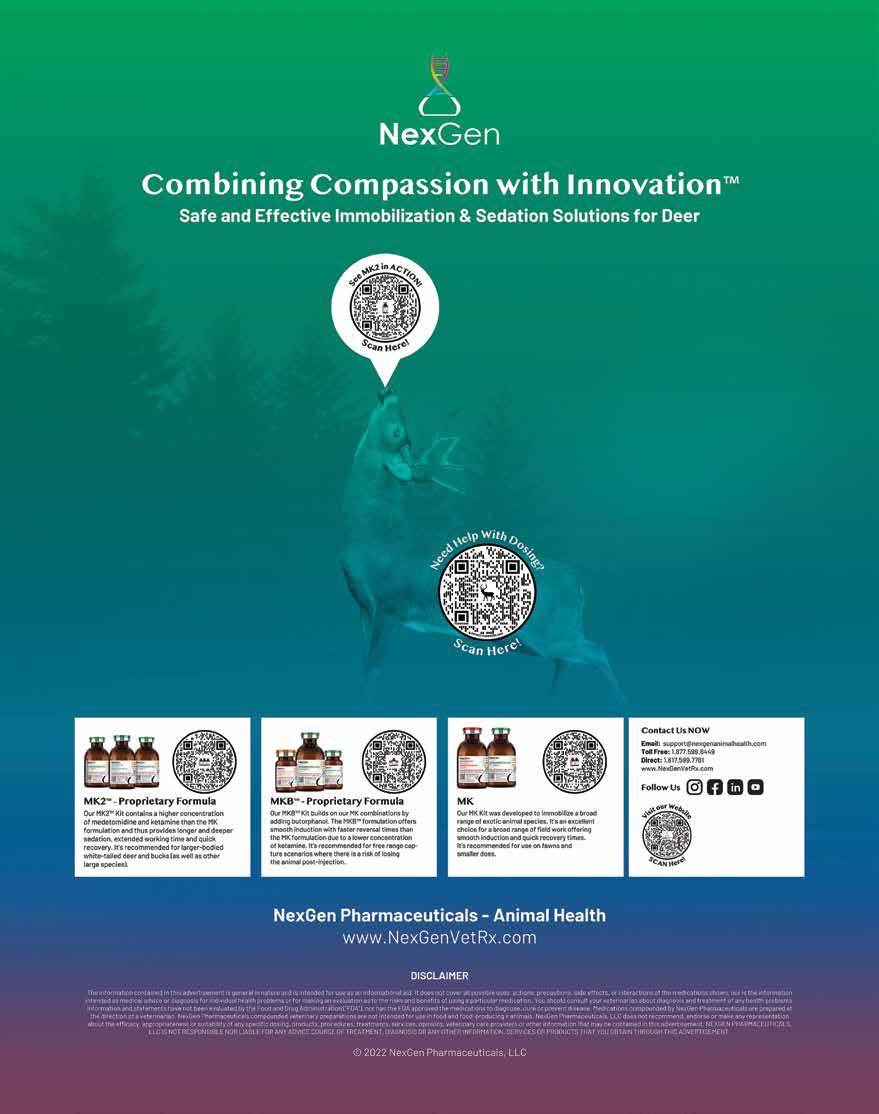














President
John Stoltzfus
5 Star Genetics
5835 N 1000 W
Shipshewana, IN 46565
Phone: (574) 596-2347
jdwhitetails@gmail.com
Vice president
Lester Eicher
Springfield Whitetails
14905 Springfield Ct Rd
Grabill, IN 46741
Cell: (260) 341-3614 springfieldwts@gmail.com
Secretary/Treasurer
Earl Hershberger
Clear Creek Whitetails
6960 W 200 N
Shipshewana, IN 46565
Cell: (260) 350-3506
Fax: (260) 768-4761 earlcvpg@yahoo.com
Director
Heath Alexander
Forgotten Mile Whitetails
6675 W 500 N
Pennville, IN 47369
Cell: (260) 341-7296
Email: thaeh80@gmail.com
Director
Derek Borkholder
Pine Creek Deer Farm
2877 Birch Rd
Bremen, IN 46506
Cell: (574) 248-0322
Email: tagouttech@gmail.com
Director
Nelson Miller
Antler Ridge Whitetails
71396 CR 25
New Paris, IN 46553
Cell: (574) 312-1349
Fax: (574) 538-2105 nelmiller26@gmail.com
Director
Dr. Darryl Ragland, DVM, Phd
625 Harrison St
West Lafayette, IN 47907
Home: (765) 494-3234
Cell: (765) 418-5673 raglandd@purdue.edu
Director
David Schwartz
Shallow Pond Whitetails
3990 N 675 W
Shipshewana, IN 46565
Cell: (260) 336-1687 shallowpondwts@gmail.comt
Director
Jerry Schwartz
Countryside Whitetails
10852 W 900 N
Bourbon, IN 46504
Cell: (574) 907-9457
Fax: (574) 546-0390
Director
Cletus Bontrager
Twin Maple Deer Farm
8820 W 050 N
Shipshewana, IN 46565
Phone: (260) 768-4284
Director
Lance Whitsell
Valhala Farm

1277 West Scratch Gravel Rd
Liberty, IN 47353
Phone: (513) 839-5001
lance.whitsell71@gmail.com
Director
Rober Yoder
Cedar Road Deer Farm
6664 Cedar Rd
Bremen, IN 46506
Phone: (574) 646-2504
byoder@hardwoodinterior.com
**Erica Bratton (574) 220-5652 ~ indianadeer@gmail.com
Hunting Preserve/Legislative
Chair: Dr. Ragland Committee: Andy Aker, Lance Whitsell
Public Relations
Chair: Lester Eicher Committee: Trevor Vance
Audit/Ethics & Bylaws
Chair: Josie Borkholder Committee: Robert Yoder
Fundraisers/Summer Picnic
Chair: Josie Borkholder Co-Chair: Lonnie Whetstone
Member Relations: Erica Bratton Food: Jerry Schwartz Committee: Earl Hershberger, Nelson Miller, Brian Bratton, John Stoltzfus, Robert Yoder, Heath Alexander, David Schwartz, Lance Whitsell.
Budget Committee
Chair: Earl Hershberger Committee: Nelson Miller, David Schwartz
IDAC
Chair: Dr. Ragland Committee: Shelly Chavis, Shawn Schafer
Join our IDEFA Committees: 2024-2025
Hunting Preserve/Legislative
Chair: Committee: 2 spots available
Public Relations
Chair: Committee: 1 spot available
Audit/Ethics & Bylaws
Chair: Co-Chair:
Fundraisers/Summer Picnic
Chair: Co-Chair:
Member Relations: Erica Bratton
Food: Comittee: 8 spots available
Budget Committee
Chair: Committee: 2 spots available
IDAC
Chair: Committee: 2 spots availble

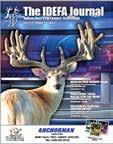





It sure was great to see so many of you at this years’ Annual Picnic/Fundraiser! Many of you renewed your memberships for the 2024 year, thank you for getting ahead of the game and getting that done. We accept memberships all year round. The form is in the journal.
You’ll also notice that we are including a copy of the necropsy reimbursement form. For members with voting rights, this is the form for you! By using this form when submitting your necropsy to IU, you authorize IU to send the test results to us for our information gathering. For this information IDEFA will reimburse you the cost of the tests needed, any additional tests will be your responsibility. Use this form that gives permission to send the results to us, submit your necropsy, pay your bill then mail us a copy of your paid invoice for us to reimburse you.
With the newly elected officers comes new committee assignments. If you would like to help on a committee, let us know! We’d love to have your talents!
If you have any suggestions and/or wish to volunteer, we would love to have you! If you’d like to be on the ballot for a Board position in next year’s election, please let us know!
Erica Bratton
Administrative Secretary
Cell: 574-220-5652
Fax: 952-955-6022
indianadeer@gmail.com
Dear Fellow Deer Farmers,
Greetings to all Deer Farmers near and far away. First, I would like to thank every Deer Farmer who participated in the August picnic at the Sammlung Platz. We had a great attendance of people, and the sale was good. I would like to thank Gary Olson of Minnesota for bringing his helicopter down to the picnic to give rides.
The battle in our surrounding states continues to rise against our Deer Farmers. Minnesota and Missouri are in a legal battle now. For those that were not at the picnic, IDEFA gave Minnesota & Missouri funds to help with their battle. As an industry, we need to stand together. United we stand, divided we fall. As IDEFA we will continue to help the states with their financial as much as we can. Us as IDEFA had a great victory a few years ago. We could not have done it financially ourselves as an Association without the help of other states. We got our deer farms under agriculture and are no longer und the DNR Regulations but monitored by BOAH.
With that being said, I hope all is well with everyone’s deer farm. We are entering an exciting time of the year with marketing bucks and preparing for breeding season, AI, etc. Hope to see everyone at the Hoosier Buck Sale and winter sales!
Blessings,
Lonnie Whetstone





The use of artificial insemination (AI) in farmed cervid production has steadily grown in popularity. It has been used as a means of rapidly improving the genetic base in cervid herds without the need to acquire and maintain superior, more costly bucks or bulls. Artificial insemination is a timed procedure in cervids and preparation for AI requires synchronization of the doe or cow, such that their reproductive cycle is at the appropriate stage to produce a viable ova that will be released and fertilized after introduction of semen into the reproductive tract. Achieving proper synchronization for AI requires hormonal manipulation of the female because they are required to cycle outside of when they would normally be receptive to males. This aspect of the AI process will be summarized.

The process of estrous synchronization typically begins with the placement of a CIDR or controlled intravaginal drug release device. The CIDR is a molded silicone device that is saturated with progesterone, the hormone that is responsible for maintaining pregnancy in many mammalian species. After placement of the CIDR in the vagina, the doe or cow will absorb the progesterone contained in the CIDR into their blood. When this occurs, ovarian activity ceases for a period of time. As such, follicular development and ovulation
will not occur during the time that the CIDR is in place. When the CIDR is removed, blood progesterone will drop precipitously and the ovaries will become active. Follicular development and maturation will proceed with eventual release of ova that will be ready for fertilization. The CIDRs used to synchronize deer are different than those used to synchronize elk. Due to their size, sheep CIDRs are used in deer and these devices contain 0.3 grams of progesterone per CIDR. Cattle CIDRs are used in elk and contain 1.38 grams of progesterone per CIDR. The CIDR is placed in the vagina for a period ranging between 10-14 days, depending on the veterinarian supervising the process. Upon removal of the CIDR, equine chorionic gonadotropin or eCG is often administered via injection. Equine chorionic gonadotropin is also known as pregnant mare serum gonadotropin or PMSG. Derived from the blood of pregnant mares, it promotes the development of estrus and encourages follicular development and maturation. Based on personal experience with whitetail deer, administration of eCG is not necessary for does to achieve
estrus, after CIDR removal. Does displayed very good “heats”, with heavy mucus production indicative of active estrus. Advisement should be obtained from your veterinarian regarding the use of one or two CIDRs in whitetail deer to induce estrous synchronization. Again, based on personal experience with whitetail deer, placement of one CIDR should be sufficient to achieve estrous synchronization.
The time selected to inseminate cervids after CIDR removal varies across species (fixed-time AI). Ideal insemination times of 50 to 52 hours post-CIDR removal has been described for whitetail does and 60 to 66 hours post-CIDR removal for elk cows. Studies evaluating timing of insemination post-CIDR removal has suggested that conception rates for whitetail deer are equally satisfactory when they are inseminated after 60 hours. Insemination may be accomplished by deposition of semen inside the vagina and






near the cervix (transvaginal), inside the folds of the cervix (intracervical), or inside the body of the uterus via laparoscope (laparoscopic). Due to the offset arrangement of the cervical rings in whitetail does, depositing semen through the cervix and into the body of the uterus is not possible. With all methods of AI, proper restraint of the doe or cow is critical to the success of the procedure. Restraint in a drop chute or squeeze chute is often adequate for transvaginal and intracervical AI. Laparoscopic AI requires the complete immobilization of females subjected to this procedure to minimize complications and risks of injury to animals and the personnel handling them. Sedation and anesthetic protocols should be developed with the input
of your veterinarian. After insemination, the hormone gonadorelin, is administerd via injection. The purpose of gonadorelin is to promote the secretion of luteinizing hormone or LH, which has the function of driving the release (ovulation) of mature ova for subsequent fertilization and implantation. Several manufacturers produce gonadorelin and the product selected for use should be based on input from your veterinarian. To overcome potential failure of the AI process, males may be introduced into the breeding group 10 to 14 days after insemination. Bucks and bulls may be grouped with does and cows for up to two estrous cycles to accomplish natural insemination of receptive females. The gestation period for whitetail deer is estimated
to be 200 days and the gestation period for elk ranges between 240 to 262 days. The gestation period for red deer is estimated to be around 236 days.

Sheep and Cattle CIDRs manufactured by Zoetis (EAZIBREED™ CIDR®)
Pregnant mare serum gonadotropin (PMSG) manufactured by MERCK (Folligon® PMSG)
Gonadorelin manufactured by Zoetis (Factrel®)
Gonadorelin manufactured by Boehringer Ingelheim (Cystorelin®)
References are available upon request.






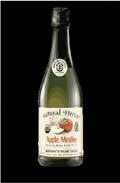











The clock was close to striking midnight when Jake Anderson set out for an eastern Kentucky elk hunt in September of 2013. This trip would be one of several he would take in an effort to not waste the coveted elk tag he had drawn from the Kentucky Department of Fish and Wildlife lottery earlier that summer. His plan, along with packing his hunting bow and camping gear, was to arrive at daybreak to scope out promising areas for the harvest.
“The maps provided by fish and wildlife were terrible,” Anderson, who was 25 at the time, said. And even though he stopped at several places to ask the locals about elk sightings “no one could tell me anything,” he added. “This was all on public land with no guide.” It took five trips. The first was with one of his hunting friends. Although on that trip Anderson squarely landed an arrow into a really sizable bull, the big elk was completely unfazed by the shot and continued on chasings cows, until completely disappearing from sight. His fifth trip found him shooting a fatal arrow into what Anderson still
considers his “once-in-a-lifetime” freerange elk. Luckily, the elk had expired on a dirt road on land formerly used for mining, and Anderson was able to bring his truck into the exact location and load the entire body into his truck bed.

Ironically, as he arrived to this particular spot to gather his elk, he found five elk standing right there, all bigger than the one he had just taken down. “I thought ‘you gotta be kidding me. This is just my luck,” Anderson said, even though he was really happy with his hunted treasure. During another hunt, a whitetail hunt in Kansas, both Anderson and his uncle had shot an arrow at a buck. Anderson, however, had taken and landed the first shot. Both men, upon searching for their deer, thought that their arrow had certainly been the fatal one. However, when they found the buck, only one arrow was in it. “That was another memorable hunt that really stands out for me,” Anderson said.
Yet, in all the hunting adventures he’s enjoyed throughout the years, Anderson has noticed one thing. Public land for hunting decreases every year.
According to internet research, rapid urban sprawl has been responsible for close to 14,000 square miles of land development between 2001 and 2019, which comparatively is an area roughly five times the size of the State of Delaware. Real estate values for farmland have also increased substantially throughout recent years, making selling the land more enticing particularly in states such as Pennsylvania, Ohio, Michigan and Florida. Other states experiencing the most accelerated urban growth have included Texas, Illinois and North Dakota. “Unless you own land or are leasing it, our opportunities to hunt in open range are going to be gone,” Anderson, owner of Anderson Whitetails in Guston, Kentucky, said. “There is less and less land to hunt and we are going to get to a point where there will be no place left to hunt. This is where we are lucky to have high fence hunting. You could hunt your whole life and never have the opportunity to shoot one like you have in a preserve.”
“Without high fence hunting, it is so hard for an individual to find somewhere to hunt that’s not developed or leased out,” Anderson emphasized. “If I visited a preserve, I’d like to get another elk. Same for other hunters. It wouldn’t have to be just a whitetail. You might be sitting in a deer stand an elk goes walking by and you change your mind and want one of them instead. And you wouldn’t have to go through the hassle of entering a lottery and getting a special tag. Preserve owners are playing a vital role in current and future land conservation, and in providing the sustained opportunities to enjoy unforgettable hunts.”









When prepared correctly, a nice, juicy venison steak can be like no other. To ensure a more “sweet” taste and avoid the “gamey” taste, it’s all about precise cooking and good preparation.
Venison, in general, is more lean and has an abundance of capillaries (vs beef)…. meaning more blood. This will give the meat a more rich, sweeter taste. However, it also has less moisture. Therefore, when cooking venison it can dry out very quickly causing that awful gamey taste. It is always important to not overcook a steak, but when it’s venison it’s essential. The longer you cook a venison steak, the more “gamey” it will taste.
Happy Cooking!
• 4-6 Venison Steak (we used elk)
• 1/3 cup brown sugar
• 1/2 cup olive oil

• 1/2 cup soya sauce
• 1/2 cup Jack Daniel’s Whiskey
• 1/4 cup Dijon mustard
• 1/2 TBSP salt
• 1 1/2 TBSP your favorite steak seasoning
In a large mixing bowl, combine all ingredients (aside from the steaks). Mix well. Pour marinade into a large ziploc bag.

Add the steaks to the marinade, and seal the Ziploc bag well. Marinade in the refrigerator for at least 2 hours and up to 8 hours.
Oil the grill grates. Start up the grill and heat to about 500 degrees Fahrenheit. I use our Broil King gas grill. I find when searing steak, the pellet grill just doesn’t get quite hot enough. If you’re going to do this in a kettle, I recommend getting a vortex to get a good searing heat out of the coals.
Place the steaks on the grill and monitor closely. How soon you flip will depend on how thick the steaks are. These particular elk steaks were on the thinner side and I was flipping them within 3 minutes. Use a instant read thermometer to determine doneness. You want to remove the steaks when the internal temp. is 130 degrees Fahrenheit. We have a guide that details how to grill the perfect steak for some extra tips.
Place the steaks on a plate or platter and tent with aluminum foil. Allow to rest for 5-10 minutes.
Serve and enjoy!




Major League/Bambi 20-28/Rolex/Pink 12 Venom/Judge's Prodigy/Jumbo/Big Momma Quick Silver/Thunderstorm/Arty/Roman's mom Blackjack/Major League/Gunslinger/Maxbo XL/Heather Blackjack/Venom/Judges Prodigy/Danger/Hardcore/Heather

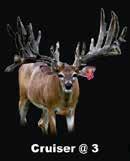

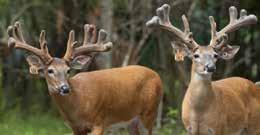



Navigator/Cruiser/Voodoo's Magic/Big Stitch/Golden Danger's sister




 By: Gail Veley • Sponsored by WOL
By: Gail Veley • Sponsored by WOL
Preparing your bucks for the hunt begins long before warm and humid summer months turn into cooler and crisper fall days. Although the feeling of autumn ascending upon the earth makes hunters usually think of only one thing – hunting – preserve owners have begun preparing for those hunts months before. In fact, it may feel as though they are always perpetually preparing in one form or another. However, February can be a crucial month in this overall process. “After the hardest part of the winter is over, I start in February making sure I have enough protein available to my bucks in my preserve who were not harvested the year before,” said Brandon Bollinger of 2 Brothers Whitetail in Loranger, Louisiana. “Protein gets them from the rut back into condition. The key is their body condition.”
An essential source of protein can be found in clover plots. “You want to make sure those are ready for spring,” Bollinger, 47, said. “The key to growing big deer is putting a buffet in front on them and as little amount of stress as possible.” Bollinger, who makes a point of closely watching and surveying his bucks all summer, starts rolling his preserve cameras in July, in an effort to
ensure those bucks, currently residing inside, are ingesting enough adequate protein to meet size standards for the upcoming season. Bucks currently residing in pens are also closely monitored as plans progress to stock the preserve. And although Bollinger raises enough of his own bucks to not need to buy more, he feels that selling some of his own while acquiring some from other farms, keeps his inventory varied and perhaps more appealing to hunters.
Bollinger, in addition to knowing how to raise the most appealing buck, has also learned through the years the most appealing circumstances of introducing bucks into a preserve. “I start in August while they are still in velvet,” he said. “Don’t do it the day before a hunt. Put them in the preserve in August while they are in velvet and learning where they want to be, and they are calm. You also need a 30-day buffer to make sure the medications they need for transport are out of their system.” Preceding these precautions is the most valuable advice: Introduce them into the preserve at night. “You have much less of a chance of losing them because it’s not as hot.” Although some preserve owners prefer a method of introduction referred to as “soft launching” by first placing deer in a large pen inside the preserve, Bollinger finds that “day of” or prompt introductions can work just as well.
In an effort to make this type of introduction as safe as possible, Bollinger also advises to not only have food and water sources located interiorly of your preserve, but all along the fence line as well, as deer tend to gravitate to the fence
and pace and without easily accessible water and food, could dehydrate and die. In also realizing that deer learn the sound of an ATV or truck means food is coming, he makes a habit out of dropping hunters off during hunting season from a vehicle, making it easier for them to slip into advantageous places. Although Bollinger takes every precaution necessary to make sure his deer thrive, fatalities are inevitable. “I always have or carry a 10 buck “buffer” from what I grow compared to what I buy, which is about a 20% buffer overall,” he explained. “We hunt about 60 bucks a year.”
While the thrill of the hunt is the most compelling part of deer farming, feeling compelled to create understood payment terms between seller and buyer is what may keep a deer farmer in business. “When you are buying stockers, you should have a very clear warranty period. This is very important. The general rule is seven days. Should deer purchased not survive beyond seven days, the seller usually compensates the buyer in some form or another, Bollinger said. “Make sure you have an agreement in place.”





















The rules for sudoku are simple.

A 9x9 square must be filled in with numbers from 1-9 with no repeated numbers in each line, horizontally or vertically.
To challenge you more, there are 3x3 squares marked out in the grid, and each of these squares can’t have any repeat numbers either.

Send in this picture with your childs name and age for a chance to be featured in the next magazine or on our facebook page!
All ages welcome to participate!
Pictures can be emailed to deerassociations@gmail.com or mailed to Samantha Uchytil
19291 59th St NE New London, MN 56273
Be Creative and add in a background for Bunny!





















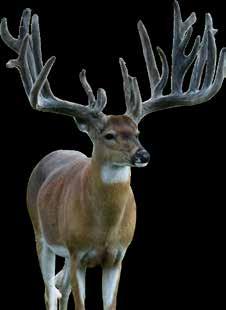
Afunctional facility in a location ideal for raising healthy whitetails can be the key to success, according to Donald Hill, owner of Oak Creek Whitetail Ranch in Bland, Missouri. When building a facility, understanding the psychology of deer is the first thing, followed by designing a facility that keeps them as calm as possible, which allows you to work as safely as possible. Whether it be a fawning facility, A.I. facility or handling facility, each should be constructed utilizing the driest location on your property, while considering the efficiency needed to move deer. “Until you look at a lot of different properties and see those facilities in action, it can be hard to understand them,” Hill said. “If you are new to deer farming or are thinking about redesigning your facility, I suggest visiting every farm possible so that you can develop a handling facility that deer are comfortable running through. Each farm will be different and in turn need a different design.” At Hill’s farm, he has two different facilities that each work better than the other for their specific function and layout.
Neither system would work as good at the other location or for that function. Amy Nold, owner of Nold Farms LLC in Urich, Missouri, agrees with Hill’s theory. “Having the ability to provide quality herd management is the key to any successful operation,” she said.
Although handling deer safely once they are inside your facility is important, the process of moving deer into it is key. “You cannot have a 45 or 90 degree turn straight into your barn,” Hill emphasized. “The approach into your barn is a very important thing. It must be well lit in the area where you are bringing the deer inside. You ideally will want several 130 degree turns leading into your barn, so the deer feel as though they have escaped from you when they go around each corner.” In addition, “a chute that is user friendly that one person can operate is a must,” Nold emphasized. “You can have the most elaborate system leading up to the chute, and still struggle with the wrong chute.” Deer farmers planning to use laparoscopic A.I. should install several knock down stalls that provide an area free of stress for does to be comfortable after being sedated. “If you plan on growing, leave room to add interior wellventilated holding stalls,” Hill explained. “I personally like my stalls 8’ x 8’ feet or smaller. Anything larger than 8’ the deer will want to jump over. Lower ceilings will also help to keep them from jumping. We also like to use push boxes that are 4’ x 4’ feet so we can use a 4’ piece of plywood as a push door.”


“If I had to do it all over again, I would build my own push gate boxes instead of buying boxes and not waste money on push walls,” Hill said. “Many factors make a facility work better, there is no way to describe them until you are experiencing it.” Hill also advises to
spend the money up front to put a 10’ to 15’ alley between each pen and around your whole facility. “I did not do this at first trying to save money, and regretted it since day one,” Hill shared. “If you have alleys between and around the facility there is no need for shade cloth, and you don’t have to worry about your bucks fighting with each other or wild deer.” In striving to move deer efficiently into a barn, Hill also strongly believes in narrowing alleys down gradually to 4 feet, and only using push gates once the deer are inside the barn. The ability to weigh your deer on a scale inside your facility can also prove very valuable in monitoring their nutrition or in determining whether or not there are any underlying health issues. However you may utilize a facility, at the end of the day “if you are having any injuries or deaths while working deer, you need to look at your design again and revamp it,” Hill said. “In a well-functioning facility, you could pull 130 deer for LAP A.I. and have them awake and back into their pens in less than four hours. A good facility is a game changer.”







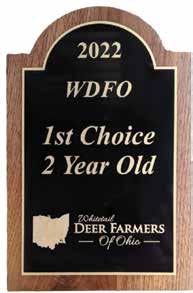







***Meetingsareopentoallcurrentmembers. Members,please contactoneofyourBoardofDirectorsforcallincodesand/or locations***
2023
Ø Monday, October 9th, 2023 – @ 7 PM – Phone Conference
2024
Ø Monday, January 8th, 2024 @ 6 PM – Face to Face @ Lester’s
Ø Monday, March 11th, 2024 @ 7 PM – Phone Conference
Ø Monday, May 13th, 2024 @ 6 PM – Face to Face @ Lester’s
Ø Monday, June 24th, 2024 @ 6 PM – Face to Face @ Lester’s
Ø Saturday, August 2nd, 2024 @ TBD – Face to Face @ Annual Meeting/Fundraiser & Picnic
Ø Monday, August 19th, 2024 @ 6 PM – Face to Face
Ø Monday, October 14th, 2024 @ 6 PM – Phone Conference
Address: Conference Call # Lester Eicher # 1-605-475-4700 Ext. #386360 14659 Springfield Center Rd Grabill, IN 46741




Rut and reduced feed intakes can bring out the worst in bucks and irritable behavior can rear it’s ugly head!
PeaceMaker is scientifically formulated to provide optimal support levels of magnesium, Vitamin B1 and inositol to help maintain a normal and relaxed disposition in cervids
Now enhanced with appetite stimulants and probiotics for digestive health
Contains no herbals nor tryptophan, eliminating concerns of unwanted side effects
Use PeaceMaker™ to help “keep the peace” during pre-rut, rut, transportation and other key times during the year









Now available in a 30 lb resealable bag and 11.25 lb pail to help fit your operation’s needs


ROBUST, FAST GI SUPPORT FOR FAWNS & OLDER DEER

Designed to quickly support normal GI health



Novel formula delivers powerful immune support


Can be used post tranquilization to help speed recovery


DIGESTIVE HEALTH & IMMUNE SUPPORT CERVIDS OF ALL AGES




Supports digestive health and a healthy immune system
Natural formula contains Encrypt®, egg proteins, enzymes, micro-encapsulated probiotics and a prebiotic
Top dress or mix in feed during fawning season, weather changes, times of stress and when top performance is desired

Autumn
Acorn

Apple Leaves
Colors
Pumpkin Sweater
Maize
Scarecrow
Turkey Antlers
Buck Harvest
Cider
Cranberry
Hayride
Sunshine Foliage
Hibernate
Migrate
Umbrella
Raincoat
Orchard
Frost Season

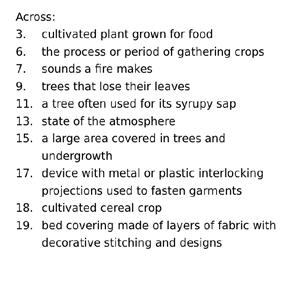



Our disposable RDDs are shorter in length and the lightest on the market thereby providing the ultimate accuracy while reducing the potential for problematic hematomas. Our Slo‑Inject® technology means that your medicine is delivered in the most effective manner possible. Pneu-Dart. When you can’t afford to miss.®









If you would like your farm or business featured on our business card pages, email digital pdf file or scanned image (must be readable resolution) of your business card to the email address below.


This gives IDEFA members a way to reach out to one another for services and to buy or sell deer! There will be limited pages for these card spreads, first come first serve. The overflow would be placed in the next issue and cards will be rotated each quarter.
Email to: Erica Bratton indianadeer@gmail.com


 By: Gail Veley - Sponsored by Whitetails of Oklahoma
By: Gail Veley - Sponsored by Whitetails of Oklahoma
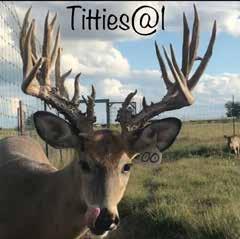
Ooklahoma can boast about something few states can. There has never been a confirmed case of Chronic Wasting Disease (CWD) in either farmed or free-range whitetail deer. However, Oklahoma has been very fortunate in this regard. Through a program developed by the Oklahoma Department of Agriculture in conjunction with Whitetails of Oklahoma (WOO), deer farmers within the state have the option to operate their farms under a CWD/TB/ Brucellosis Monitored status or a NonMonitored status.
Which one you choose could depend on what part of the deer industry you are catering to and the potential amount of sales you wish to generate, among other things. Oklahoma farmers with monitored herds can sell deer to any state that will or can accept them. Oklahoma farmers with non-monitored herds can only sell their deer within the Oklahoma state borders.
However, raising a non-monitored herd has never been to the detriment of Barry Reed, 47, owner of Big Head Whitetails in Pryor, Oklahoma. “I sell out of stockers every year,” said Barry, who leans towards raising non-typical deer with a good frame. “I can’t raise enough to keep up with the demand. This year I sold all of my available inventory including bred and open does.” To further guarantee his deer are marketable in light of his nonmonitored status, Reed infuses quality genetics from the likes of Maxbo, Express and Pay Day into his herd and also promotes his prize breeding buck “Titties.” While he finds being nonmonitored less stressful on his daily farm operation “there are advantages
to being monitored,” he said. “There is a bigger breeder market and doe market if you can sell to other states like those up north.” Yet, if he was monitored, he admits he could find himself needing to be more closely concerned about overall production.
While agreeing that being monitored has it’s advantages, Don Elder of Oak Hollow Exotics feels he has absolutely no need to be, as he easily sells all of his genetically-proven inventory every year to the tune of at least 25 deer. “I’ve had several friends that were monitored, but it got too costly and time-consuming,” he said. “Now I only know two to three people who are still monitored.” While Elder, 67, used to raise and sell elk and fallow deer, he became nervous when CWD began to show it’s face among elk. According to internet research, in 1998, a case of CWD was found in a captive elk at a neighboring Oklahoma farm that had been imported from Montana. As a result, the entire elk herd was euthanized. Consequently, since 2008, Elder has only raised and sold whitetails, and finds immense gratification in doing so.
Yet, gratification in having and maintaining a monitored herd is what motivates Chris Ezell to do so at his farm, Dangerous Whitetails of Oklahoma. “To qualify as a CWD/TB/ Brucellosis Monitored herd, you must test for CWD, TB and brucellosis. To do that, you need to run all of your deer through your handling facility and pull blood from them to be sent off for testing. This is a costly expense,” Ezell explained. “You also must test every animal over 12 months of age that dies on your farm. This means you must take the head of the deceased animal to your vet and pay to have the test done. You must also keep
up with all of the paperwork and use multiple tags on your deer. All of these requirements take time, cost money and put extra stress on your animals. And, if you damage one deer in the process it could cost you $5,000 to $10,000 or more to treat it. So, with that being said, if you do not do all of these things you can only sell your deer within the state of Oklahoma. I personally own deer in several states and have partners who wish to move animals to different states that have been born in Oklahoma. These deer usually possess high end, nationally marketed genetics. Therefore, the value offsets the time and expense and headaches of doing what it takes to be monitored,” he added. “If you feel your deer are worth the time and expense to be monitored, you owe it to yourself to explore that option.”






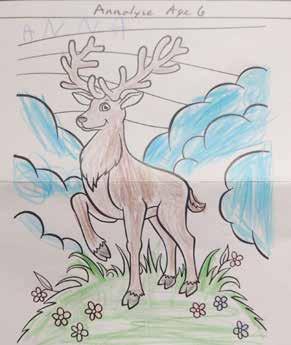



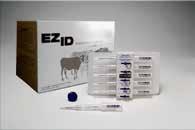





Date: _____________
Indiana Deer & Elk Farmers’ Association
2024 Membership & Information Form
Membership
is
Name:__________________________________________________________________
to
Farm or Ranch Name:______________________
Address:________________________________________________________________
City:__________________________ State:______ Zip:___________County__________
Home Phone:_______________________ Farm Phone:________________________
Cell Phone:________________________ Fax Phone:__________________________
E-Mail:____________________________ Web Site:____________________________

Please circle the any information that you would NOT like published on the IDEFA website or in IDEFA mailings
Are you a current IDEFA member (Y/N)? Member Since ___________
Which species of cervidae do you own?________________________________________
What is your TB, Brucellosis and CWD monitoring status? (list dates):_______________
Circle ALL of the items for purchase at you r farm:
Membership Categories __________ $ 75 Full Membership plus Spouse with Voting Rights __________ $ 50 Full Membership with Voting Rights __________ $ 50 Supporting Membership without Voting Rights
Return Form and payment to: IDEFA-Erica Bratton
IN 46761


ADDL at Purdue University
HEEKE ADDL - SIPAC
406 S University St 11367 E Purdue Farm Road
West Lafayette, IN 47907-2065 Dubois, IN 47527-9666
P: 765-494-7440 F: 765-494-9181 P: 812-678-3401 F: 812-678-3412
VETERINARIAN:
Name
Dr. Jeff Pyle
Indiana License #
Clinic Address City, State, ZIP
24004598
Phone Fax
Manchester Veterinary Clinic 11798 North State Road 13 North Manchester, IN 46962 (260) 982-6673 (260) 982-8200
Results: Fax Email
Additional Results by:
Email Fax
jbpyle@fcremc.coop springfieldwts@gmail.com (260)768-9182
OWNER:
Name
Address City, State, ZIP
Bill to Veterinarian Bill to Owner (Phone)
ANIMAL: Site/Farm/Unit Address City, State, ZIP
Site/Farm/Unit Phone
SIGNATURE FOR REGULATORY SUBMISSION: Veterinarian
HISTORY: Clinical Problem: Respiratory Enteric Neurologic Reproductive Other
Age _____ day wk mo yr # On Site _____ # In Affected Group _____ # Sick _____ # Dead _____ Breed ____________
Animal ID Weight ____________ Date & Time of Death _______________________________
Cause of Death: Natural / Euthanasia - If euthanized, method used: ______________________
Were barbiturates used? Yes / No - If chemical euthanasia, chemical(s) used: ________________
I certify that the animal has not been exposed to a level of chlorinated pesticides or PCBs in excess of regulatory limits for animals. As the responsible party, I certify that the above information is accurate and true.
Signature and Date: ___________________________________________
***Testing is approved for Mycoplasma spp. PCR on any respiratory case. If identified, lung tissue is to be forwarded to Newport Labs with the IDEFA Newport submission form on file. ***CWD samples will be collected and tested on all cervidae greater than one (1) year of age.*** Please perform culture and sensitivity on tissue samples submitted or tissues that are visibly diseased at time of necropsy. Also perform parasitology testing.
ATTENTION IDEFA MEMBER: Once results are released to above destinations you will be entitled to your reimbursement from IDEFA
Differential Diagnosis or Disease(s) Suspected _________________________________________________________________________________________
Legal/Insurance
Rabies Suspect (County) _______________________________________
Standard Necropsy Abortion Protocol
Species:
Aquatic
Avian
Bovine
Camelid
Canine
Caprine
Cervid
Equine
Feline
Ovine
Porcine
Other
Sex:
Male
Female
Male - Neutered
Female - Spayed
Cremation:
Pets Remembered (ADDL-WL Only)
Pet Rest
Individual Cremation
Group Cremation
Ashes Returned To:
ADDL/HEEKE
Owner
Vet Clinic
Client of Cremation Service?
Yes No
The owner of the animal or any agent acting with the express authorityof the owner agrees that the specimens have been submitted to ADDL and will be handled by ADDL in accordance with ADDL testing procedures, policies, and fees. This handling will include all specified testing and safe disposal of the animal’s remains. Specimens and derived isolates become the property of the Indiana ADDL and may be used for teaching or research purposes. The owner expressly consents to such use. In addition to the testing specified above, additional testing may be done: 1) to meet state or federal surveillance programs, 2) by order of state or federal animal health officials, or 3) when a Foreign Animal Disease is suspected. This form only lists frequently requested tests. For the complete list of tests, consult the ADDL Fee Schedule. Visit
CF.929

